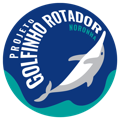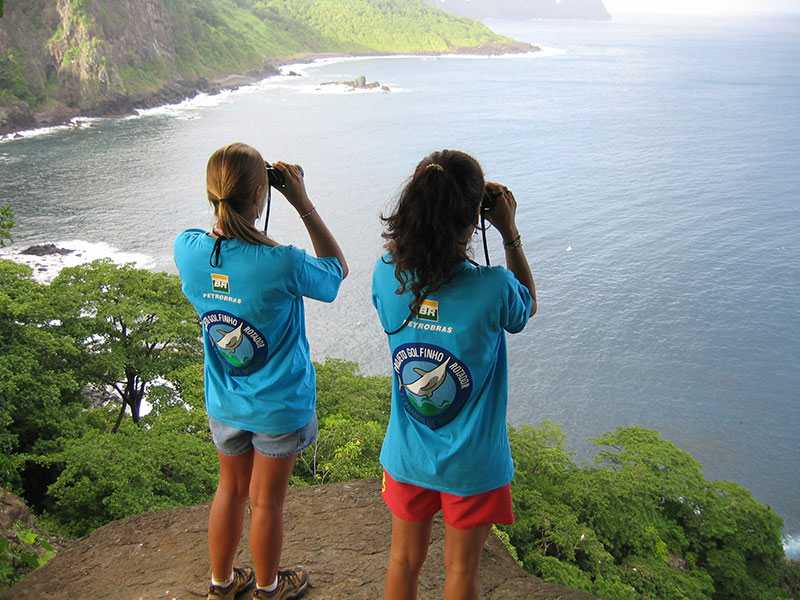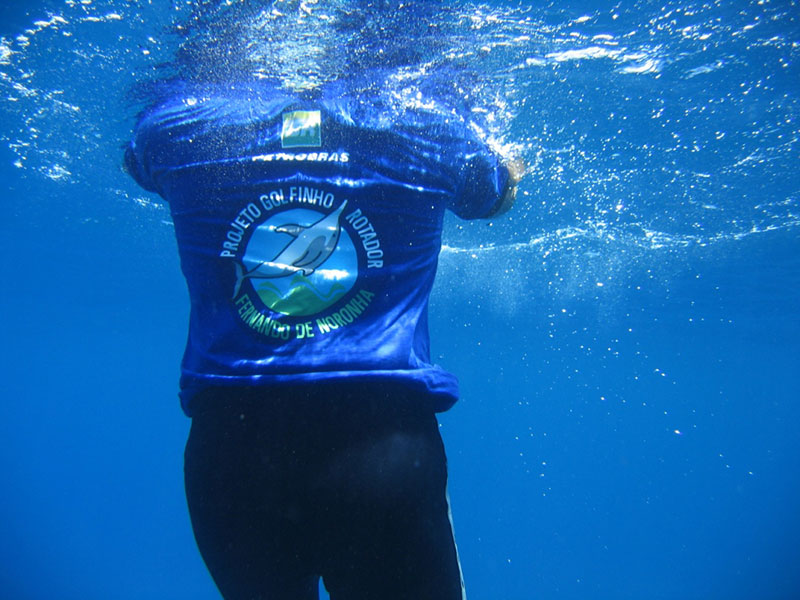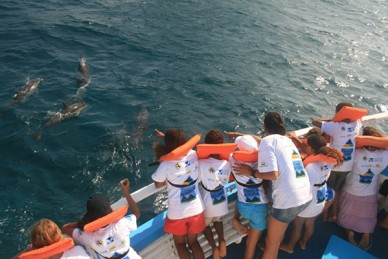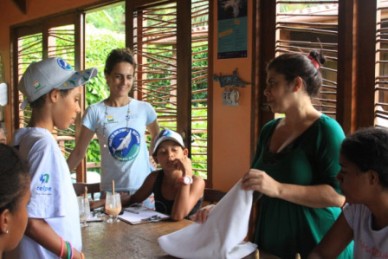It was born in 1990 of a passion and necessity to preserve Noronha’s dolphins, the spinner dolphins. The Spinner Dolphin Project is located on Fernando de Noronha Island, undertaken by the NGO Spinner Dolphin Center and officially sponsored by Petrobras by means of the Petrobras Social and Environmental Program.
The Spinner Dolphin Project
Spinner Dolphin Project’s Identity
Our Mission
Develop scientific research, environmental education, community involvement and sustainability actions to foster conservation of the spinner dolphins, Fernando de Noronha Archipelago and marine biodiversity.
Our Vision
Become a world reference on environmental conservation and sustainability in insular ecosystems.
Our Values
Science, commitment, communication, cooperation, ethics and sustainability.
Our Positive Results
ENVIRONMENTAL: Because of preservation actions developed by the Spinner Dolphin Project and ICMBio, the number of spinners remains practically the same since 1990, when the Spinner Dolphin Project initiated: spinner dolphins continue to enter 95% of the days of the year in the Dolphins’ Bay, preferred place of these aquatic mammals, to rest, to communicate, to reproduce and to nurse their young.
CONSERVATIONIST: Propose, create, divulge and monitor conservation standards for cetaceans (dolphins and whales) and for Fernando de Noronha (FN), like the regulation of the Brazilian Institute of Environment (IBAMA) No. 05/1995, which defines specific guidelines to avoid disturbance of the spinner dolphins that daily come to Fernando de Noronha; aggregate the value of sustainability when it comes to human occupation on Fernando de Noronha Island; subsidy plans and guidelines for the sustainable development of the island.
ENVIRONMENTAL EDUCATION: Raise awareness of islanders and visitors about the need to preserve cetaceans (dolphins and whales) and the planet as a whole.
SCIENTIFIC: Discover and divulge that rest is the main use of the Dolphins’ Bay by the spinners; describe the behaviour of rest, reproduction, care and nursing in natural environment for the species Stenella longirostris; qualify and quantify the occupation of the spinners that daily come to Fernando de Noronha; qualify and quantify the impact of nautical tourism on dolphins.
SOCIAL: Empower islanders to join the Ecotourism market. Sponsor local cultural and sports initiatives, such as maracatu and surfing.
ECONOMICAL: Divulge Fernando de Noronha in Brazil and abroad as a destination for Ecotourism.
TOURISTIC: Promote improvement in the services of tourist guiding and lodging by means of our training courses and also guide the local people on how to implement a sustainable management in their business.
Getting to Know The Spinner Dolphin Project
The Research Program, developed since 1990, consists in the study of the natural history of the spinner dolphins through seven sub-programs: cetacean distribution and area occupation; behavioral ecology; individual cataloguing; genetic profiling; interaction with tourism; trophic behaviour, and Aquatic Mammal Strandings Network. Project researchers have gathered more than 5,764 days and 51,050 hours of observation at the Dolphin’s Bay and more than 1,646 days and 17,772 hours at the Remedios Fortress, plus 1,500 dives with the spinner dolphins.
Research results were already published in 5 books, 7 book chapters, 6 Ph.D. theses, 9 M.Sc. dissertations, 31 undergraduate conclusion papers, 25 published papers and 124 presentations in scientific events.
Read and download for free our material at “PUBLISHINGS”
The Environmental Education Program, undertaken in partnership with the National Marine Park and Environmental Protection Area of Fernando de Noronha and the Archipelago School, is focused on marine issues and the ecological inter-relationship of this ecosystem with the everyday life of the local population and visitors.
Our main goal is to sensitize local people and tourists about the need to preserve dolphins and the planet as well. More than 410,603 tourists were already benefitted from field orientation: 196,444 at the Dolphin’s Bay, 206,329 during boat tours and 7,830 at lectures at the ICMBio’s Auditorium. For Fernando de Noronha’s students, more than 650 workshops on environmental education theory and practice were done, totalizing more than 8,500 students.
The Community Involvement Program aims at stimulating the sustainable development of Fernando de Noronha, promoting professional skills, supporting cultural and sports initiatives, and enhancing political representation of the islanders.
Capacity-building occurs through the undertaking of our professional skill courses on Ecotourism, aiming at the insertion of islanders in the Ecotourism market. The professional skill courses for local tourism, such as tourist guiding in the Marine National Park of Fernando de Noronha, scuba dive instructor and English classes, are held for free. Since 2005 the Spinner Dolphin Project has already offered 63 professional skill courses on Ecotourism, totalizing 3,983 participants with a completion / approval rate of 71.17%.
The Spinner Dolphin Project also continuously sponsors some of the main cultural and sports initiatives of Fernando de Noronha, such as the D. Nanete Cultural Group, the Maracatu Nação Noronha music group, and the local Surf Association.
Another outstanding action of the Spinner Dolphin Project is the encouragement of youth protagonism and the formation of local leaderships through support to the ComVida Group at the Archipelago School and the holding of training workshops for local leaders.
We believe that the practice of sustainability enables the harmonious relationship between human activities and the preservation of the natural environment.
Sustainability is in the daily life of our team and is guided by our Sustainability Policy. The architectural project of our headquarters was made according to the concept of sustainable architecture, receiving, in 2006, 1st Place in the Procel Prize (Power Efficiency) – Building Category (see more at “Acknowledgments”).
In order to minimize the ecological footprint of human occupation on Fernando de Noronha (FN), the Spinner Dolphin Project offers free consultancy on sustainable management to FN’s lodges, seeking the improvement of indicators related to management of water use, solid waste, liquid effluent, supplies, power efficiency, labor and income, quality, sustainable tourism and legislation.
We also launched a new and challenging stage, which was the creation of four Classification Matrices for Lodges, Bars and Restaurants, Vessel Tours and Recreational Diving to apply for the “Seal Noronha+20”. The seal’s objective is to promote the adoption and maintenance of sustainable practices. These matrices were built and validated in joint work with local entrepreneurs of each sector as well as with the different local councils and the local management offices.



